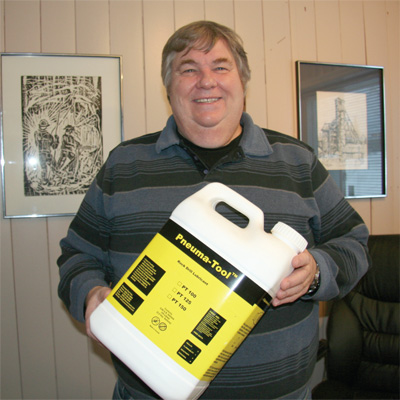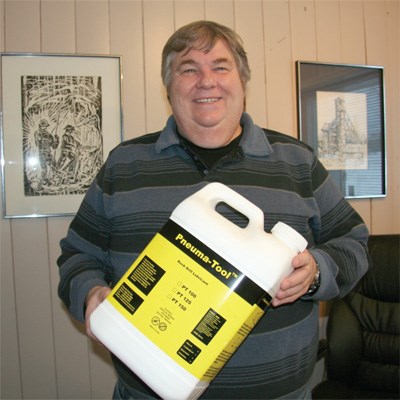
Miners using jacklegs and stopers know all about the hazards of oil fog. As compressed air passes through the tool, it siphons oil from the in-line lubricator. The oil enters the tool in an atomized state and fogs up the workspace, coating the miner’s lungs and making it difficult to see.Miners around the world put up with it because no one has figured out how to make rock drill oil that doesn’t produce fog. Until now.Keith Klayh of Pneuma-Tool, a North Bay startup, became interested in oil fog in 1997. A former director of sales with Magnus Chemicals and a chemist himself, Klayh experimented with different formulas for several years. A business opportunity in Sault Ste. Marie sidetracked him for a while, but by 2008, he had teamed up with partner Bill Culhane in North Bay and was back at it.“We started doing testing of various formulas and working with manufacturers of specialized base fluids,” said Klayh. “We ran through almost 50 formulas before we came to the Pneuma-Tool formulation that worked.”The esters used in the Pneuma-Tool rock drill oil are negatively charged and the steel itself is positively charged, “so the polar esters work like a magnet on steel,” he explained. “It’s difficult for them to be liberated into the air.”The complex esters “are very tenacious in terms of holding themselves together,” said Klayh. “They’re tacky and they tend very strongly to resist atomization by the compressed air forces. They will compress, but they’ll form a larger drop and once they hit the tool and are exposed to the steel, they attach themselves to it like a magnet.”
Klayh ran pneumatic tools for hours in live tests to confirm the elimination of oil fog and has uploaded videos to YouTube to prove it.
Hazards
A fog-free working environment keeps miners’ lungs from being coated with oil particles and improves their awareness of hazards such as loose rock.
Safety glasses covered by oil fog impair visibility, so miners often don’t bother wearing them, said Klayh.
“Why would they? It’s a worse hazard when they can’t see.”
Using Pneuma-Tool rock drill oil, they’re more likely to wear their safety glasses.
Klayh patented the product in November 2009 and persuaded the Redpath Group to field test it at Goldcorp’s Red Lake Complex where they were working on several alimack raises. Redpath used the Pneuma-Tool product on one raise and a competitive product on the other. Not only did the Pneuma-Tool rock drill oil not produce fog, it also prolonged tool life.
“Over a period of four months, they went through eight air motors on the competitor’s side and they were still using the same air motor on the Pneuma-Tool side, “ said Klayh.
“Mining is all about breaking rock and getting it to surface. If you’re not breaking rock, you’re not making any money, so the bottom line is anything that makes those tools work more reliably and last longer is better.
“Remember, in many cases, you’re down 5,000 to 8,000 feet and maybe five kilometres off to the side. If you lose a tool, your shift is done, so Pneuma-Tool is as much about productivity as it is about safety.”
Sales
“Halfway through 2010, we felt we had enough data to start doing some sales,” he said.
The product is sold in 10-litre jugs that fit inside a Pneuma-Tool miner’s bag for handy carrying. It’s more expensive than conventional rock drill oils, but is used at a consumption rate of between one-third and one-half of competitive products, said Klayh.
Aside from cleaner air and improved visibility, the Pneuma-Tool product also reduces the hazard of slipping on slick surfaces.
“If you’re working on a raise platform that’s covered by oil fog, it’s slippery,” said Klayh. “With our product, the oil drops down the leg of the tool and pools. You just have to take a cloth and wipe it off.”
Freeze-up is a major problem with pneumatic tools.
“During the changing of the seasons, primarily spring and fall, compressed air often contains a lot of water,” said Klayh. “Very few mines actually use desiccators or air dryers, so the moisture laden compressed air is delivered directly to the pneumatic equipment. This can cause two issues - freeze-up and corrosion. Competitors often address the water issue by adding emulsifiers to their rock drill oils to scavenge the water from the air, creating an oil/water emulsion to protect the tool. However, in some cases, the ratio of water in the air is sufficiently high to wash out the rock drill oil, leaving the tool vulnerable to corrosion and wear caused by lack of lubrication.
As compressed air passes through the tool and decompresses, there is a dramatic temperature drop which often results in freeze-up, especially at the muffler. The tool chokes off, and the miner must either thaw the tool before resuming work, or chip the ice off with his miner’s wrench. Both of these scenarios are detrimental to productivity, and hamper the miner’s ability to make his round for the day.
Pneuma-Tool’s patented polar formulation adheres directly to the tool steel, creating a surface which ice cannot adhere to, thereby eliminating freeze-up. Any ice formed in the tool is simply expelled from the tool by the high velocity compressed air, eliminating down time due to tool freeze-up.
Klayh estimates that the global market for rock drill oils is worth $6 billion, but doesn’t expect to ever capture more than a small percentage of it.
“It’s a paradigm shift,” he said. “You have an old, established industry that’s used to doing things the same way forever. It takes time to get people to accept a new idea.”
Plans for the future include a $6 million to $7 million packaging plant in North Bay.
“Once we get a few big customers on board and accumulate more data, we’ll have it made, but it takes time,” said Klayh.


